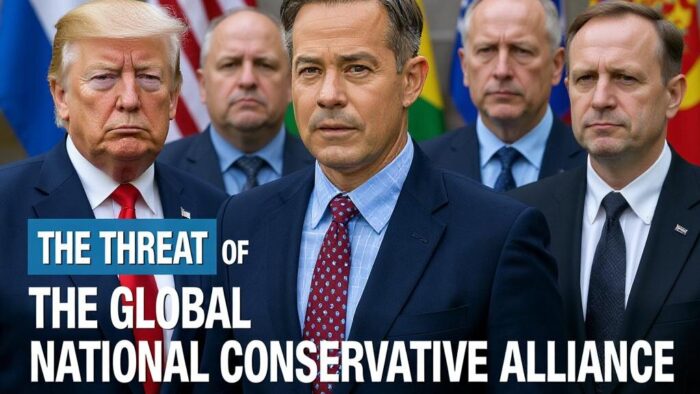The Global Influence Operations Report (GIOR) is pleased to present Part 2 of our series on the threat posed by the Global National Conservative Alliance (GNCA):
Across the West, the Global National Conservative Alliance (GNCA) is marketing itself as a respectable alternative to liberal decline, one rooted in tradition, order, and sovereignty. But beneath this polished exterior lies a deeper structure, one disturbingly familiar to students of 20th-century history. The slogans have changed. The targets are different. But the logic—the architecture of thought—is alarmingly close to what powered the fascist movements of interwar Europe. Here’s how.
1. Civilizational Decline as a Political Framework
National conservatives often frame the West as culturally and morally bankrupt, corrupted by globalization, feminism, multiculturalism, or LGBTQ+ rights. It’s not just political rhetoric. It’s a foundational story: that we were once strong, now we are weak, and liberalism is to blame.
🧱 Modern Example: UK National Conservative MP Kemi Badenoch warned that “Western civilisation could collapse like the Roman Empire” unless immigration is slashed and traditional culture restored (The Times).
🏛 Historical Parallel: Weimar-era conservatives in Germany blamed “Jewish intellectualism,” feminism, and modern art for the moral decay of the Volk. The Nazis purged cabaret, shut down the Bauhaus, and rebranded modern culture as “degenerate.”
📌 Same tactic: Construct a mythic past. Declare it lost. Blame liberalism and minorities.
2. Power Over Process
Today’s national conservatives routinely attack institutions of liberal democracy—courts, supranational bodies like the EU, and regulatory systems—as obstacles to the “will of the people.”
🧱 Modern Example: Hungary’s Viktor Orbán has dismantled judicial independence, curbed press freedoms, and declared that “liberal democracy is over” (Wikipedia).
🏛 Historical Parallel: Mussolini dismissed parliamentary democracy in favor of la volontà del Duce—the will of the leader. “Democracy is beautiful in theory; in practice, it is a fallacy,” he said.
📌 Same disdain: Elevate willpower over process. Portray procedure as weakness. Glorify the strongman.
3. Re-Masculinizing Politics
National conservatism often scorns “woke culture,” mocks queer and trans people, and promotes a politics of conquest and “strength.” These aren’t just policy stances—they’re identity statements.
🧱 Modern Example: More than 25 U.S. states have enacted bans on trans athletes in school sports, presenting it as fairness but signaling a return to rigid gender norms (CBS News, Time).
🏛 Historical Parallel: Nazi Germany promoted a hyper-masculine soldier-farmer ideal. Homosexuality was criminalized, and even loyal Nazi Ernst Röhm was purged for being openly gay.
📌 Same pattern: Mock softness. Celebrate domination. Treat gender nonconformity as cultural rot.
4. Biological Essentialism
National conservatives often assert that sex and gender are biologically immutable. The rejection of trans identity is framed not as a disagreement but as a defense of “nature.” This belief often extends into coded racial and national boundaries.
🧱 Modern Example: Orbán stated that Hungary “does not want to become peoples of mixed race,” directly echoing white nationalist “replacement” narratives (The Guardian).
🏛 Historical Parallel: The Nazi Nuremberg Laws defined Jewish identity by bloodline. Fascist Italy similarly codified racial hierarchies under the guise of “biological truth.”
📌 Same instinct: Define identity by biology. Police belonging through ancestry.
5. The Aesthetic of Strength
National conservatism exalts tanks over tech, steel mills over screenwriters. Culture, in this worldview, is only valuable if it serves national power. Everything else is weakness or decadence.
🧱 Modern Example: Badenoch advocates for higher defense spending and industrial muscle while scorning “moral preening” and the service economy (The Times).
🏛 Historical Parallel: Fascist Germany and Stalinist Russia both defined greatness through military and industrial output. Non-conforming artists were purged or exiled. Cultural independence was seen as a threat.
📌 Same symbolism: Culture must serve the state—or be destroyed.
Final Thoughts: The Dangerous Proximity
National conservatism doesn’t need a swastika to be dangerous. It doesn’t need brownshirts or goose-stepping parades. All it needs is to normalize the idea that:
- Some people don’t belong
- Law should bend to force
- Democracy is a luxury we can no longer afford
This isn’t political correction. It’s historical repetition. And we already know how the story ends.
For Part 1 of this series- Inside the GNCA: Anatomy of a Transnational Threat (Series Part 1 of 3)
For Part 3 of this series- National Conservatism’s Weimar Echo (Series Part 3 of 3)











